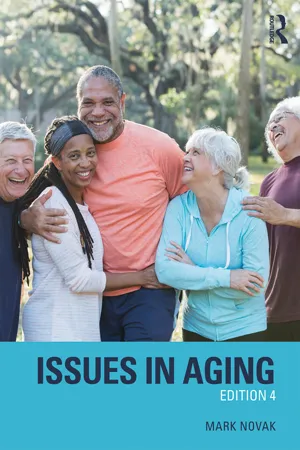Learning Objectives
After reading this chapter you will be able to:
- LO1 Describe the goals of gerontology.
- LO2 Recognize ageism and understand its effect on older people.
- LO3 Recognize the sources of ageism in Western society.
- LO4 Replace myths about aging with factual knowledge.
- LO5 Explain some of the ways that thieves attempt to steal from older people through fraud, and the effects of victimization.
- LO6 Criticize workplace discrimination and its effects on older workers.
- LO7 Explain what gerontologists mean by “the ageless self.”
- LO8 Describe the reason for the emergence of the “Third Age” and “the Fourth Age.”
- LO9 Point to changes that can moderate ageism including educational programs and social policies.
Jessie Taylor called for a cab and headed downtown for her last appointment of the day. She works for the state office on aging. She monitors nursing home standards and teaches staff ways to improve patient care. Jessie is 63 years old. She has a pear-shaped figure, a pixie grin, and a mop of gray hair. As she got out of the cab, the driver got out, too. He grabbed her elbow, ushered her across the street, and deposited her on the sidewalk. “You can’t be too careful crossing the street these days,” he said, then smiled and waved goodbye. Jessie said that when she goes to her local supermarket, the checkout clerk often asks other customers to wait a moment while she checks Jessie’s things through. Then, one of the workers helps her to her car with her groceries.
All of this used to surprise Jessie. After all, she works at a job like everyone else, drives her own car when she travels out of town, and serves as a leader in her profession. Yet sometimes people treat her like a frail old woman. People see her kind face, gray hair, and wrinkles and they want to help her. They imagine that she needs help doing simple things because of her age. I asked Jessie whether she ever tells people that she doesn’t need their help. She said that sometimes she does, but she doesn’t want to discourage these people from helping someone in the future, so often she goes along and grins to herself.
Jessie knows that stereotypes can be useful. They help us get along in a complex world where we know only a fraction of the people we see and meet every day. But stereotypes can lead to problems. Jessie sees stereotyping every day in her work. She listens as nursing home aides call patients “dearie” and “sweetie.” She watches as workers use baby talk with their adult patients.
Stereotypes can lead us to misjudge people, to treat them inappropriately, and in the case of older people, to assume that they need help.1 Stereotyping can also lead to prejudice, a negative attitude toward a person, and to discrimination, unfair treatment based on prejudice rather than merit. Gerontology, the systematic study of aging, attempts to counteract stereotyping and prejudice. It presents a more balanced view of later life. This chapter looks at (1) the benefits of studying aging, (2) the social basis of age stereotyping, and (3) changes in society that will lead to new images of later life.
Key Terms
stereotyping to believe unfairly that all people with a particular characteristic are the same.
prejudice a negative attitude toward a person based on their social characteristic such as age, gender, ethnicity, or race.
discrimination unfair treatment based on a prejudice rather than merit.
gerontology the systematic study of aging.
Why Study Aging?
Everyone can benefit from the study of aging. First, gerontology can help you understand current social issues. A society with an increasingly older population, for example, will experience changes in social institutions. Consider the following changes that will occur in three institutions: the family, the health care system, and recreation programs.
- More people than ever before will live in what some gerontologists call beanpole families. These families have three, four, or more generations alive at the same time. Each generation has relatively few members due to smaller numbers of children being born. Older people in these families will live into late old age. Some of them will need caregiving help from their younger family members. Others will live independently or with some formal help in late old age.
- Older people will get more of their health care services in the community. Programs such as visiting nurse services, Meals on Wheels, and foot clinics at senior centers will help keep seniors in their homes longer.
- Older people will take part in more active recreation programs, including fitness programs, adventure travel, and university courses.
These changes will lead to different social service needs, and this will require a shift in economic resources. Should the government give more money to older people? Will this mean less money for other age groups? Will it lead to tensions between the generations? Answers to these questions will shape public policy in the future. The study of aging allows you to understand and respond sensibly to such issues.
The second reason for studying aging is that you might plan to work in a field that serves older people. Students in nursing, social work, or physiotherapy will almost certainly work with older people. Students in recreation studies, architecture, or family studies will also benefit from understanding aging. Even students in business programs need to know about aging. Companies from banks to restaurants to travel agencies now see older customers as an important part of their clientele. You will work with older people in almost any field you choose. Knowledge of aging will give you a better understanding of your clients and their needs.
Third, most of us live in families with older members. Your parents and grandparents will soon face many of the issues discussed here. You can help them deal with the issues of later life by studying aging.
Jeanne, a student in one of my classes, used her knowledge of aging to help her grandmother stay involved in family life. She noticed that her grandmother had begun to avoid Sunday family dinners. Jeanne discovered that her mother had told her grandmother not to bother making the potato salad for dinners anymore. Jeanne’s mother wanted to make life easier for her grandmother, whose arthritis had gotten worse.
The grandmother felt that she had lost an important role in the family. If she couldn’t help cook the family dinner, she decided she wouldn’t come at all. Jeanne explained the situation to her mother, and they arranged for Jeanne to work with her grandmother in preparing the potato salad. The grandmother enjoyed teaching Jeanne her recipe, Jeanne got to know her grandmother in a new way, and her grandmother started coming to Sunday dinners again. Greater awareness of aging issues can make you a resource to your community, your family, and yourself.
Most people know something about aging before they study the subject. They know about aging from their personal experiences, from their contact with older people in their families and neighborhoods, and from the media. Still, this gives a limited view of aging, one that sometimes mixes truth with bias and myth. A person who has watched a relative or friend die of Alzheimer’s disease, for example, may fear aging. But relatively few people contract this disease. Most older people are healthy into late old age. The Federal Interagency Forum (2012, p. 29) said that between 2008 and 2010, “76 percent of people age 65 and over rated their health as good, very good, or excellent.” Even at age 85 and over, 67 percent of people report good or better health.
Older people form a diverse group. Some people have problems, while others report high life satisfaction. “Apart from dementia,” Zarit said, “older people have lower rates of mental disorders than other adult age groups and generally report higher emotional well-being. … This is a finding supported by virtually every epidemiological survey” (2009, pp. 675–676). Zarit concluded that “older people may, in fact, be somewhat better off—happier, less depressed, and even less lonely than the other adult age-groups” (p. 678).
Jivraj and colleagues (2014) conducted a long-term study of people age 50 and over in England. They found high subjective well-being among their subjects. They also found that, compared to younger cohorts in their study, older cohorts report higher levels of subjective well-being. They found this pattern well into old age when poor health and widowhood led to decline. The researchers said that
Satisfaction with life … seems to increase in older cohorts and increase at a faster rate when controlling for marital and health status. … [this] shows that as people age, their health declines and they have less partnership support, they nevertheless become more satisfied with their circumstances, and are happier in their situation than they would have been if they had been younger.
(p. 939)
In spite of results like this, Hummert (2011) said that, with respect to aging, “the number of negative stereotypes exceeds that of positive stereotypes” (p. 251). Gerontologists work to replace myths and stereotypes with facts and knowledge. They have conducted many studies that look at current images of aging and attitudes toward old age.
Ageism
Some years ago, Robert Butler (1969) coined the term ageism to describe these negative attitudes toward aging. The International Longevity Center (2006, p. 21) defined ageism as “Ideas, attitudes, beliefs, and practices on the part of individuals that are biased against persons or groups based on their older age.” Ageism “reflects a deep-seated uneasiness on the part of the young and middle-aged—a personal revulsion to and distaste for growing old, disease, disability; and fear of powerlessness, ‘uselessness,’ and death” (Butler, 1969, p. 243; also Butler, 2005).
Palmore (2001) reported that, in one sample of older people, 77 percent said they had experienced more than one incident of ageism. They most often reported disrespect or the assumption that they had an illness. The World Economic Forum (2012, p. 10) found that ageism “is prevalent worldwide.”
Hess (2006, p. 384) reviewed the psychological literature on aging stereotypes. He found that overall “the literature suggests an underlying negative component to most categories of older adults.” Achenbaum (2015) said that “ageism remains virulent” as much today as in the past. Laboratory studies of attitudes about aging show a consistent bias against older people. Nosek, Banaji, and Greenwald (2002) compared subjects’ attitudes toward race, gender, and age. They found stronger negative associations with age than with race or gender.
Studies (Hummert, 2011; also Ouchida & Lachs, 2015; Davis &...





